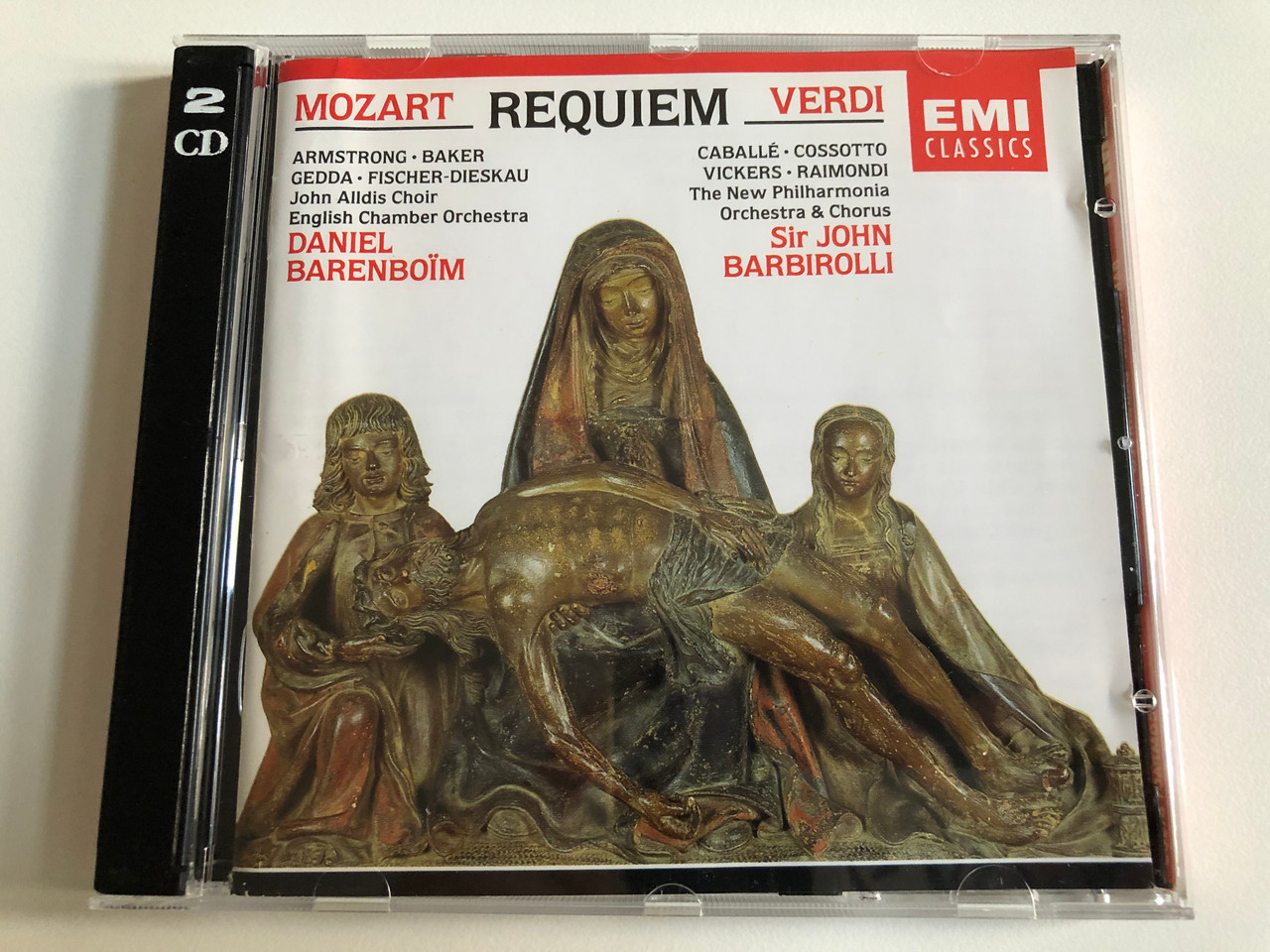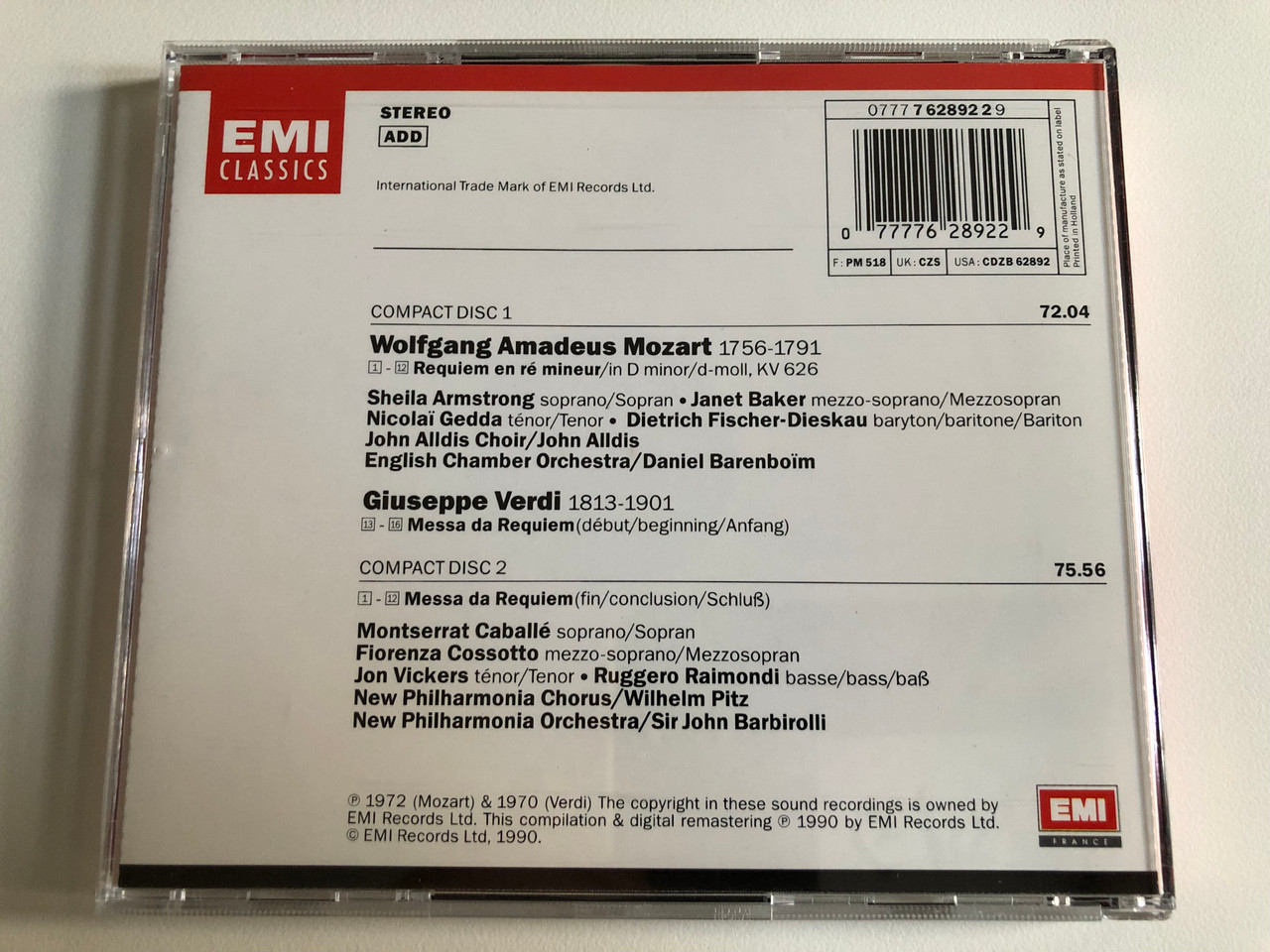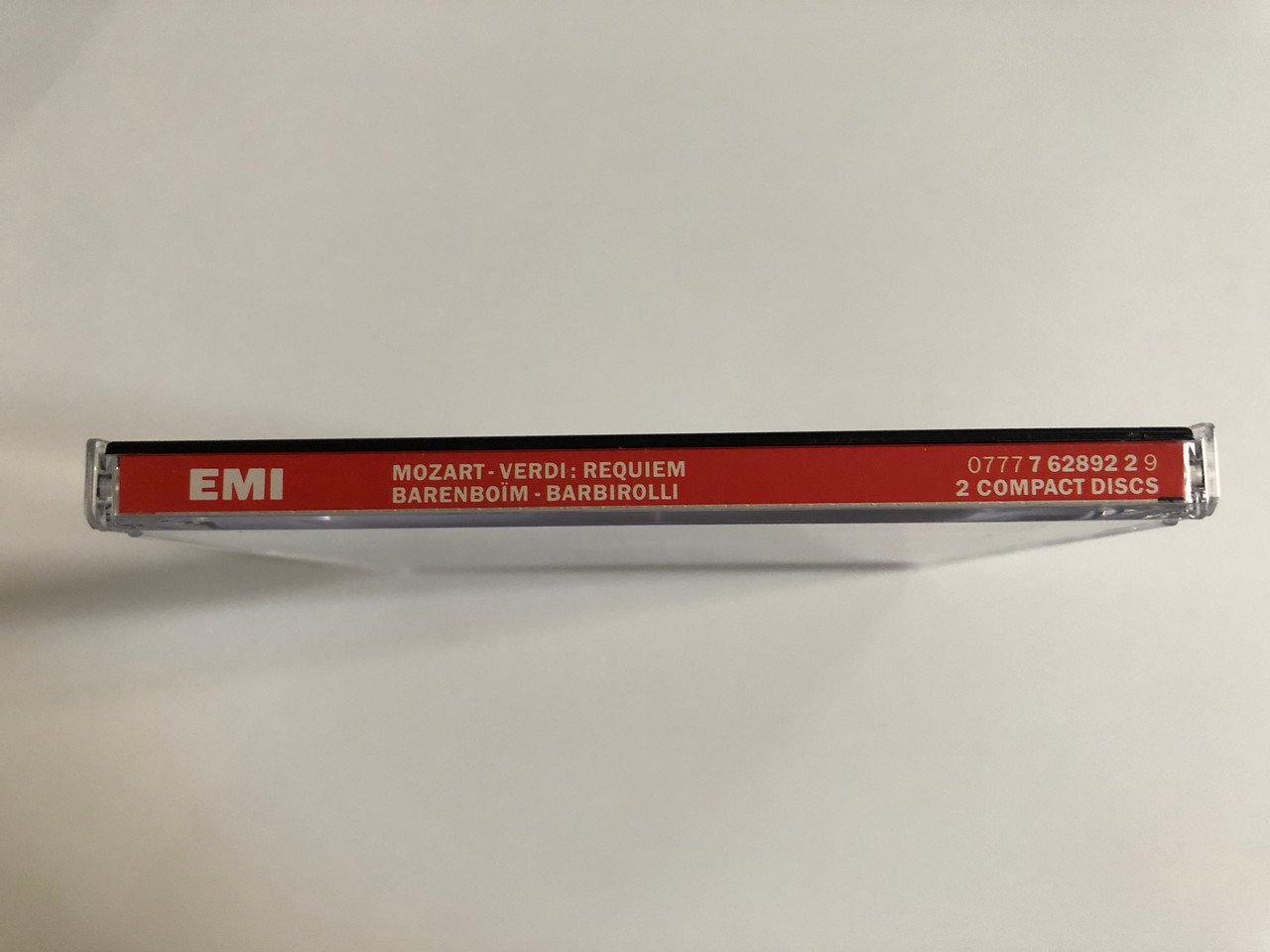Mozart, Verdi - Requiem / Armstrong, Baker, Gedda, Fischer-Dieskau, John Alldis Choir, English Chamber Orchestra, Daniel Barenboim / Caballé, Cossotto, Vickers, Raimondi / EMI Classics 2x Audio CD 1990 Stereo / 077776289229
UPC 077776289229
The Requiem in D minor, K. 626, is a requiem mass by Wolfgang Amadeus Mozart (1756–1791). Mozart composed part of the Requiem in Vienna in late 1791, but it was unfinished at his death on 5 December the same year. A completed version dated 1792 by Franz Xaver Süssmayr was delivered to Count Franz von Walsegg, who commissioned the piece for a requiem service on 14 February 1792 to commemorate the first anniversary of the death of his wife Anna at the age of 20 on 14 February 1791.
The autograph manuscript shows the finished and orchestrated Introit in Mozart's hand, and detailed drafts of the Kyrie and the sequence Dies irae as far as the first eight bars of the Lacrymosa movement, and the Offertory. It cannot be shown to what extent Süssmayr may have depended on now lost "scraps of paper" for the remainder; he later claimed the Sanctus and Benedictus and the Agnus Dei as his own.
Walsegg probably intended to pass the Requiem off as his own composition, as he is known to have done with other works. This plan was frustrated by a public benefit performance for Mozart's widow Constanze. She was responsible for a number of stories surrounding the composition of the work, including the claims that Mozart received the commission from a mysterious messenger who did not reveal the commissioner's identity, and that Mozart came to believe that he was writing the requiem for his own funeral.
In addition to the Süssmayr version, a number of alternative completions have been developed by musicologists in the 20th century.
The Messa da Requiem is a musical setting of the Catholic funeral mass (Requiem) for four soloists, double choir and orchestra by Giuseppe Verdi. It was composed in memory of Alessandro Manzoni, whom Verdi admired. The first performance, at the San Marco church in Milan on 22 May 1874, marked the first anniversary of Manzoni's death. The work was at one time referred to as the Manzoni Requiem. Considered too operatic to be performed in a liturgical setting, it is usually given in concert form of around 90 minutes in length. Musicologist David Rosen calls it "probably the most frequently performed major choral work composed since the compilation of Mozart's Requiem".
Label: EMI Classics – 077776289229
Style: Classical, Romantic
Tracklist:
| |
Sheila Armstrong / Janet Baker / Nicolaï Gedda / Dietrich Fischer-Dieskau / Daniel Barenboim / John Alldis / John Alldis Choir / English Chamber Orchestra– |
Mozart: Requiem in D minor, KV 626 |
|
| 1-1 |
– |
Requiem aeternam
|
8:08 |
| 1-6 |
– |
Confutatis maledictis
|
2:55 |
| 1-12 |
– |
Agnus Dei |
9:46 |
| |
Montserrat Caballé / Fiorenza Cossotto / Jon Vickers / Ruggero Raimondi / Sir John Barbirolli / Wilhelm Pitz / New Philharmonia Chorus / New Philharmonia Orchestra– |
Verdi: Messa da Requiem |
|
| 1-13 |
– |
Requiem e Kyrie - Sequenza |
9:54 |
| 1-16 |
– |
Mors stupebit |
1:27 |
| 2-1 |
– |
Liber scriptus - Dies irae |
5:31 |
| 2-2 |
– |
Quid sum miser |
4:14 |
| 2-6 |
– |
Confutatis - Dies irae |
5:30 |
- Baritone Vocals – Dietrich Fischer-Dieskau (tracks: 1-1 to 1-12)
- Bass Vocals – Ruggero Raimondi (tracks: 1-13 to 2-12)
- Chorus – John Alldis Choir (tracks: 1-1 to 1-12), New Philharmonia Chorus (tracks: 1-13 to 2-12)
- Chorus Master – John Alldis (tracks: 1-1 to 1-12), Wilhelm Pitz (tracks: 1-13 to 2-12)
- Composed By – Giuseppe Verdi (tracks: 1-13 to 2-12), Wolfgang Amadeus Mozart (tracks: 1-1 to 1-12)
- Conductor – Daniel Barenboim (tracks: 1-1 to 1-12), Sir John Barbirolli (tracks: 1-13 to 2-12)
- Engineer – Allen Stagg (tracks: 1-13 to 2-12), Robert Gooch (tracks: 1-1 to 1-12)
- Mezzo-soprano Vocals – Fiorenza Cossotto (tracks: 1-13 to 2-12), Janet Baker (tracks: 1-1 to 1-12)
- Orchestra – English Chamber Orchestra (tracks: 1-1 to 1-12), New Philharmonia Orchestra (tracks: 1-13 to 2-12)
- Producer – Ronald Kinloch Anderson (tracks: 1-13 to 2-12), Suvi Raj Grubb (tracks: 1-1 to 1-12)
- Soprano Vocals – Montserrat Caballé (tracks: 1-13 to 2-12), Sheila Armstrong (tracks: 1-1 to 1-12)
- Tenor Vocals – Jon Vickers (tracks: 1-13 to 2-12), Nicolaï Gedda (tracks: 1-1 to 1-12)






























